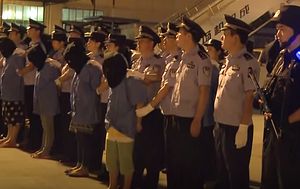On October 28, the Cambodian authorities deported 61 internet scam suspects, including 19 Taiwanese, to China. The news has been widely broadcast in Chinese state media. The Chinese foreign ministry later expressed appreciation to Cambodia’s adherence to the “One China Policy,” while the Taiwan’s Mainland Affairs Council lodged a “solemn protest.”
Ouk Heisela, director of Cambodian Inspection and Procedure Department of Immigration, said that the 61 suspects, including 13 females, were arrested in Phnom Penh and in Preah Sihanouk province where they committed crimes involving extortion of money from Chinese people in China via internet or phone, according to Khmer Times, a Cambodian news outlet
Khmer Times reported that these suspects in handcuffs were escorted from Cambodian immigration office through trucks to the airport, where a specially chartered Chinese aircraft was waiting to pick them up.
According to China’s national TV station CCTV, these 61 suspects had committed more than 200 acts of fraud involving numerous victims in multiple provinces in China. China thus sent a special group of policemen to Cambodia in September to co-investigate the cases. On October 12, Cambodia already deported the first group of 74 suspects for the same offence to China.
On October 28, Taipei’s Mainland Affairs Council (MAC) lodged a “solemn protest” against Beijing on the latest deportation. The MAC also called on both sides across the Taiwan Strait to “jointly combat crimes and safeguard the people’s interests from both sides.”
In contrast to this, Chinese foreign ministry spokesperson Hua Chunying said on October 31 that Beijing “highly appreciates” Cambodia for “its adherence to the ‘One China Policy’ and its cooperation with China on cracking down cross-border crimes, including telecom frauds.”
“The relevant department in China will handle suspects across the Taiwan Strait in accordance with law which will help get to the bottom of this case, effectively fight crimes, and protect the legitimate rights and interests of the victims,” Hua added, “We believe we will have the understanding and support of people across the Taiwan Strait and the international community.”
In fact, in recent years, Beijing has been harshly cracking down on internet and phone scams since the public anger towards such crime has reached to a high point after a series of sensational cases.
Under social pressure, the Chinese government has also been actively cooperating with foreign nations on deporting suspects who had been involved in such scams. Beijing’s strong stance on the specific crime has also won popular support.
In terms of Cambodia, Heisela told Khmer Times that since 2011, approximately 1,200 Chinese suspects (including Taiwanese) have been arrested and deported to China for internet scams.
Not only Cambodia, but other countries such as Kenya and Spain, have been cooperating with China on similar cases. That has also led to Taipei’s constant protests, as many Taiwanese nationals have been deported to Mainland China together with Chinese nationals. Taiwan’s media said it has become a common measure for Taiwanese to be deported back to the Chinese mainland. Even the MAC itself warned local Taiwanese not to commit internet scam since they could be deported to the Chinese mainland.

































